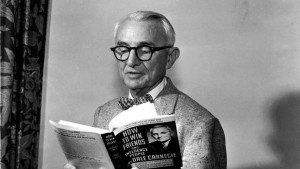Why All Founders Should Read a 78 Year Old Book in 2014
Help Me, Help You
I’m not big on self-help books. Well that’s not exactly true- I do read them, but I hate them all. I read a quit-smoking book a few years ago that explained that the key to quitting smoking was not to ever smoke again. Very enlightening stuff, to be sure, but we all know what these kinds of books are: inspirational blather that, when it isn’t telling you what you want to hear (I’m Ok, You’re Okay!), is mostly lying to you about how easy it is to do whatever the author does. And authors rarely have any valuable insights into what makes them good at whatever they do.
If it’s easy, it’s not worth writing about. And if it’s hard, it’s not fun to read about.
But I am a big reader, and I have, time and again, gone back to the well to find out what brand of bullshit is being sold this season. If it isn’t The Secret telling people that the key to success is to wish really hard for things (no seriously, it’s magic), it’s a fat guy telling you that the key to weight loss is common sense. Thanks alot, asshole.
Irony is Wasted on Evil People
“Talk to someone about themselves and they’ll listen for hours.” – Dale CarnegieAnd people who publish books like those are evil. I mean really, how low does your self-esteem have to be to go paying for advice like that? Anyone who sells you something when you’re in that vulnerable a state, promising to make things better, is an evil bastard.
There are lots of books out there. Read a lot, it’s good for you. Read about starting a business and about psychology, and history, and whatever. But don’t buy those books. Have some self-respect.
That being said, do buy one book.
Dale Carnegie: How to Win Friends and Influence People
“Names are the sweetest and most important sound in any language.” – Dale Carnegie
Carnegie got his start as a company leading salesman for Armour and Company, selling various items to ranchers and farmers in the American midwest at the turn of the century. Not at all shy about self-promotion, he changed his name from Carnagay to Carnegie, so as to associate himself with famous entrepreneur and millionaire Andrew Carnegie, and became a lecturer on salesmanship and soft-skills in 1911, after failed attempts to become an actor. While his “self-help,” movement has had bad press in recent years, with some justice, still the original is a classic, and as relevant as it ever was.
Carnegie was good at one thing: selling. And he had what can honestly be called a novel approach, now and then: caring about people. Really, deeply, with a full heart, paying attention to other people, and putting yourself in their shoes.
Why You Should Buy the Book
“You can’t win an argument. You can’t because if you lose it, you lose it; and if you win it, you lose it.” – Dale CarnegieCarnegie’s book, born as a companion to his lecture series, is not only brilliant, it’s an ur-text of content marketing. It employs, and shows how to employ, all of the skills Carnegie taught his students, holding back no secrets, and freely giving away the “game plan,” Carnegie sold in his courses. The book shows an incredible confidence in itself and its writer as the product; there are no “weird tricks,” or “10 secrets,” just point by point advice on how to conduct yourself in your business interactions.
What I really love about this book is how openly frank it is. It’s not in the least egotistical. It not only serves as a guide to how to lead a happy life as a professional, but also works as an example of how people should do business, making all the arguments transparent, clear, and responsive to doubts. Carnegie lives his rules, and the result is a genuine feeling that he cares about the reader: he wants people to do better for themselves and others.
Not Just Common Sense
“Criticism is futile because it puts a person on the defensive and usually makes him strive to justify himself. Criticism is dangerous, because it wounds a person’s precious pride, hurts his sense of importance, and arouses resentment.” – Dale CarnegieMany modern reviews of the book twig on the old-fashioned wisdom involved. Gems like (paraphrased): “never send a letter criticizing anyone for anything,” seem broadly proscriptive. But its Carnegie’s pragmatic reasoning that is convincing. Why should you never criticize anyone? Because, he argues convincingly, it will never help you or them.
Most of us have been in office environments where “constructive criticism,” was basically just saying something nice every time you say something devastatingly harmful. Carnegie argues with a great deal of evidence, that we rarely if ever have the power to truly reform others, and that we should make business decisions on a cost/benefit basis. If telling a person they aren’t performing well helps your business, you should tell them. But find a case in which doing so has a globally positive effect on that same business, and Carnegie might be impressed. He never found any such case.
He argues instead that our instinct to criticize and control the outputs of others are only superficially justified by “the bottom line,” and that the true costs of negativity are deeper than quarterly or yearly profits. If there is even a whiff of ego involved in employee discipline or in job training and retraining, he says, it is almost sure to be counterproductive. If you aren’t on the side of your employees as much as you are on the side of your customers, you might be financially successful, but you will never be happy, and neither will your employees.
And the same goes for his advice about names. It’s not for Carnegie that you should just remember someone’s name (for which skill he gives various tips and tricks), but the why of remembering a name. It’s not manipulative, and it’s not about seizing control of the conversation or getting the upper hand, it’s about making the other person comfortable: it’s about talking to the other person with the deepest level of respect; reminding yourself, by saying the person’s name, that you are helping them- that your mission is to be of service.
Carnegie wasn’t himself a business tycoon. But for him, that was never really the point. His passion, even before he left sales as a career, was to humanize business interactions. He’s commonly cited as an inspiration by successful businessmen, including Warren Buffet, who attended his courses at the age of 20. His principles were that a truly successful businessperson not only makes money, but also makes people, him or herself included, happier in the process.
Social Media Marketing: Where We Could Use a Little 80 Year Old Wisdom
“Names are the sweetest and most important sound in any language.” -Dale Carnegie
A few weeks ago, I needed a question answered by the company that supplies my home internet connection. They’re virtually unreachable by phone: it’s a Kafkaesque tangle of extensions, computer voices, and automated messages, resulting (as I suspect is the intention) in rage-quitting and going off to search for answers on their website. Frustrated with this process, I posted the question on their Facebook page, and a real human being responded in less than an hour. He used my name and everything. It was great. His answer wasn’t what I wanted to hear, but I’m still satisfied. Why?
As conversations with your market become more public, old fashioned salesmanship is becoming more important than it has been in a long time. Ironically, as we get more and more digital, we yearn more and more for the human element in our business interactions.
Carnegie was writing in a time in which mass consumer marketing was a brand-new industry. The types of businesses that thrive online today are those that were just in their infancy in the 1930s: the sales catalogue, the publisher’s clearinghouse, the mail-order fabric company, and more. And while it might seem that he wouldn’t have much authority on the subject, quite the opposite is true: Carnegie eyed the rise of mass marketing with the eye of a seasoned salesman, and believed that the principles of good sales were no different by mail.
The insistent minority voice in marketing is that the old-fashioned, bespoke approach to customers is far from dead, and is coming back in an age where direct marketing can be humanized by leveraging new technologies. It may be that a time is soon approaching when the shifting economics of online business, push the majority of the customer care and sales focus to social media accounts and public, online interactions. Will your company be prepared for that? Will you?
I think we could all use a little more humanity in 2014. So read this book. I wish everyone would.
[ssba]






